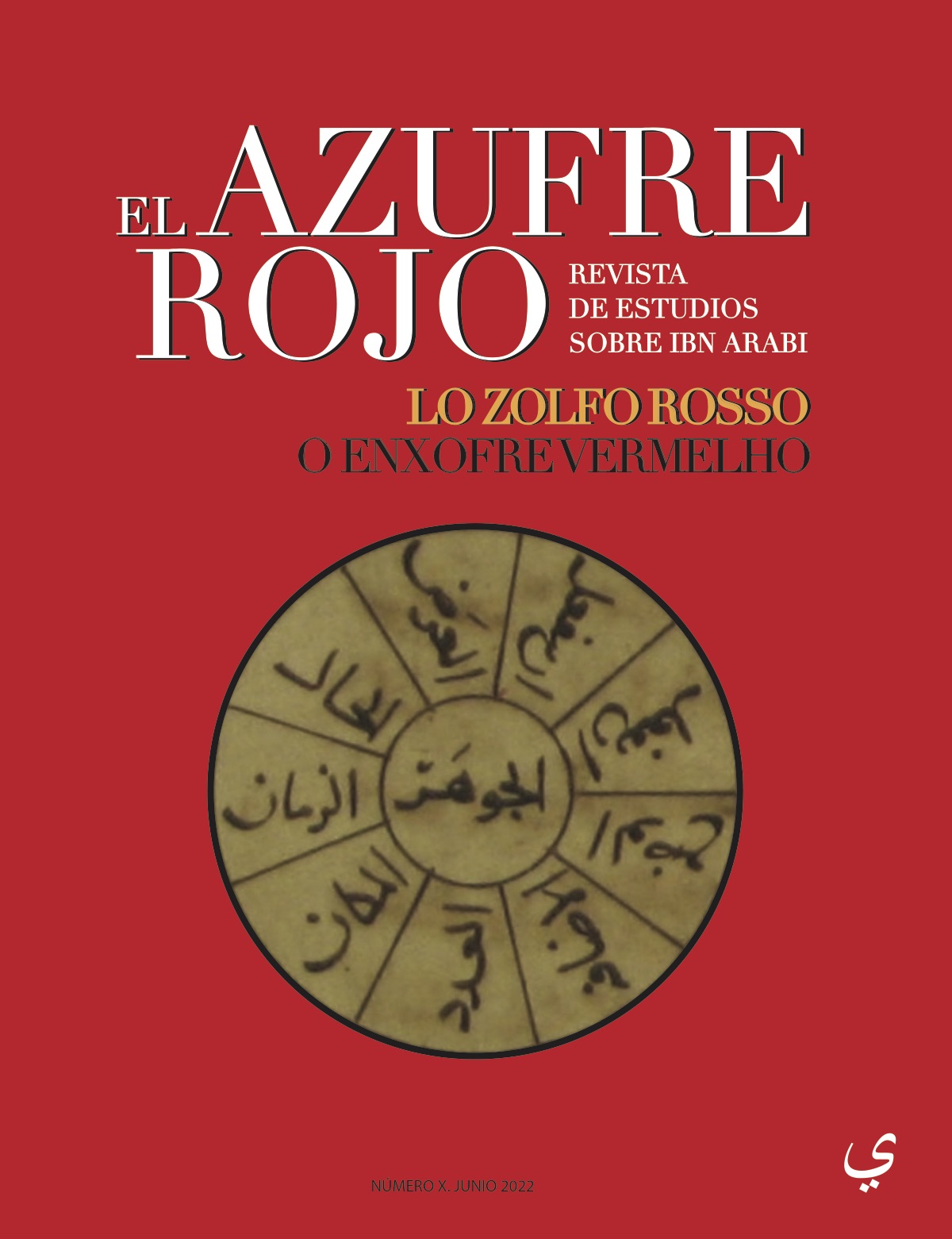MANTOS DIVINOS, DIVINOS MANTOS: TRADUZINDO OS MAIS BELOS NOMES
Abstract
Resumen: Algunas de las obras de Ibn 'Arabī, como El Secreto de los Nombres de Dios, acerca de los Más Bellos Nombres Divinos nos ayudan a encontrar en las enseñanzas del Šayḫ al-Akbar, el Más Grande Maestro, mucho más que metafísica o práctica devocional: descubrimos la dimensión espiritual de la vida cotidiana, un método de autorrealización basado en la experiencia personal de lo sagrado como dinámica de la vida. Para él, todo lo que aparece, o todo lo que se manifiesta, ya sea en el mundo exterior o en nuestra dimensión interior, es una expresión de la auto-revelación divina. Podemos abordar esta cuestión desde varios puntos de vista, y esta multiplicidad, de hecho, ya indica la realidad desde la que se presentan los Nombres.
Abstract: Some of Ibn 'Arabī's works, such as The Secret of the Names of God, on the Most Beautiful Divine Names, help us to find in the teachings of the Shayḫ al-Akbar, the Greatest Teacher, much more than metaphysics or devotional practice: we discover the spiritual dimension of everyday life, a method of self-realisation based on the personal experience of the sacred as life's dynamics. For him, everything that appears, or everything that manifests itself, whether in the external world or in our inner dimension, is an expression of divine self-revelation.
We can approach this question from various points of view, and this multiplicity, in fact, already indicates the reality from which the Names are presented.
Downloads
-
Abstract323
-
pdf (Español (España))188
Riferimenti bibliografici
REFERÊNCIAS:
AL-QĀSHĀNĪ, ‘Abd al-Razzāq, Les Ta’wīlāt al-Qur’ān. Commentaire ésotérique du Coran (tradução Michel Valsan). Paris: Koutuoubia, 2009.
BENEITO, Pablo. El Secreto de los Nombres de Dios. Murcia: Ediciones Tres Fronteras, 2012.
——-, O Segredo dos Nomes de Deus. São Paulo: Attar Editorial, 2019.
CHITTICK, William C., The Self Disclosure of God - Principles of Ibn al-‘Arabī’s Cosmology. Lahore: Suhail Academy, 2000.
_____, Sufi Path of Knowledge - Ibn al-‘Arabī’s Metaphysics of Imagination. Lahore: Suhail Academy, 2000.
IBN ‘ARABĪ, Fuṣūṣ al-Ḥikam: The Bezels of Wisdom, tradução de R. W. J. Austin, 2ª ed., Lahore: Suhail Academy, 1999.
_____, Fuṣūṣ al-Ḥikam. The Ringstones of Wisdom. Tradução e notas de CanerK. Dagli. Edição de Seyyed Hossein Nasr, Chicago: Kazi Publications, 2004.
_____, Fuṣūṣ al Ḥikam. La Sagesse des Prophètes. Tradução de Titus Burckhardt. Paris: Albin Michel, 1955.
_____, Kitāb Inšā’ ad-dawā’ir wa-l-jadāwil al-iḥāṭiyya. La Production des Cercles, trad. Paul Fenton & Maurice Gloton, Paris: Éditions de L’Éclat, 1996.
——-, Kitāb al-Yā’ wa-huwa Kitāb al-Huwa, Il Libro del Sé Divino, trad. italiana de Chiara Cassler, Turim: Il Leone Verde, 2004.
IZUTSU, Toshihiko, God and Man in the Qur’an. Semantics of the Qur’anic Weltanschauung, Kuala Lumpur: Academe Art & Printing Services, (2.ed) 2008. (Keio University, Japão, 1964).
——-, Sufism and Taoism: AComparative Study of Key Philosophical Concepts. 2ª ed. Berkeley e Los Angeles: University of California Press, 1984.
MEGARBANE, Patrick, Le Livre Descendu: Essai d’Exégèse Coranique. Paris: Books on Demand, 2015.
MOULINET, Philippe, Les Clefs d’Ibn Arabî. Commentaire intégral du Kitâb Fusûs al-̣Hikam. Paris: Dar Albouraq, 2010.
SMIRNOV, Andrey, Il vortice divino. Il monismo come interdipendenza tra zâhir-bâtin: il punto di vista musulmano e la filosofia mistica di Ibn ´Arabî. (Acesso online: https://mondodomani.org/dialegesthai/asm01.htm
WINKEL, Eric. The Youth. Introdução, Prefácio, Capítulos 1 e 2 do al-Futūḥāt al-Makkīyya de Ibn ‘Arabī. Preprint, 2016.
——-, The Alphabet. Capítulo 2 ao 16 do al-Futūḥāt al-Makkīyya de Ibn ‘Arabī. Preprint, 2016.
——-. Cosmography. Writing the Universe - Capítulo 17 ao 40 do al-Futūḥāt al-Makkīyya de Ibn ‘Arabī. Preprint, 2016.
——-. The Questions. Capítulo 73 do al-Futūḥāt al-makkiyya de Ibn ‘Arabī. (as 154 questões propostas por al-Ḥakīm al-Tirmidī, incluindo o Al-Iṣṭilāḥāt aṣ-ṣūfīyah - Terminologia Sufi). Preprint, 2016.
YOUSSEF, Mohamed Haj, Ibn ʻArabī: Time and Cosmology, New York: Routledge, 2008.
——-, Ultimate Symmetry. Fractal Complex-Time, the Incorporeal World and Quantum Gravity. Paperback, 2019


